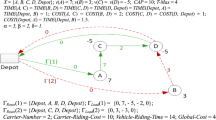Abstract
The Skill Vehicle Routing Problem (Skill VRP) considers vehicle routing under the assumption of skill requirements given on demand nodes. These requirements have to be met by the serving vehicles. No further constraints, like capacity or cost restrictions, are imposed. Skill VRP solutions may show a tendency to have a bad load balancing and resource utilization. In a majority of solutions only a subset of vehicles is active. Moreover, a considerable share of demand nodes is served by vehicles that have a skill higher than necessary. A reason for that solution behavior lies in the model itself. As no resource restrictions are imposed, the Skill VRP tends to produce TSP-like solutions. To obtain better balanced solutions, we introduce two new approaches. First we propose a minmax model that aims at minimizing the maximal vehicle tour length. Second we suggest a two-step method combining the minmax approach with a distance constrained model. Our experiments illustrate that these approaches lead to improvements in load balancing and resource utilization, but, with different impact on routing costs.
Similar content being viewed by others
References
Applegate D., Cook W., Rohe A.: Solution of a min–max vehicle routing problem. INFORMS J. Comput. 14(2), 132–143 (2002)
Baldacci R., Toth P., Vigo D.: Exact algorithms for routing problems under vehicle capacity constraints. Ann. Oper. Res 175, 213–245 (2010)
Borgulya I.: An algorithm for the capacitated vehicle routing problem with route balancing. Cent. Eur. J. Oper. Res. 16(4), 331–343 (2008)
Bowerman R., Hall B., Calamai P.: A multi-objective optimization approach to urban school bus routing: formulation and solution method. Transp. Res. A 29(2), 107–123 (1995)
Brucker P.: Scheduling Algorithms. Springer, Berlin (2006)
Cappanera, P., Gouveia, L., Scutellà à, M.G.: The skill vehicle routing problem. In: Pahl, J., Reiners, T., Voß, S. (eds.) Network Optimization: International Network Optimization Conference (INOC 2011). LNCS, vol. 6701, pp. 354–364. Springer, Heidelberg (2011)
Carlsson J., Ge D., Subramaniam A., Ye Y.: Solving min-max multi-depot vehicle routing problem. In: Pardalos, P.M., Coleman, T.F. (eds) Lectures on Global Optimization. Fields Institute Communications, vol. 55, pp. 31–46. American Mathematical Society, Providence (2009)
Chao I.-M., Golden B., Wasil E.: A computational study of a new heuristic for the site-dependent vehicle routing problem. INFOR 37(3), 319–339 (1999)
Chen, J., Chen, S.: Optimization of vehicle routing problem with load balancing and time windows in distribution. In: Proc. of 4th International Conference on Wireless Communications, Networking and Mobile Computing (WiCOM) (2008)
Corberán A., Fernández E., Laguna M., Martí R.: Heuristic solutions to the problem of routing school buses with multiple objectives. J. Oper. Res. Soc. 53(4), 427–435 (2002)
Cordeau J.-F., Laporte G.: A tabu search algorithm for the site dependent vehicle routing problem with time windows. INFOR 39(3), 292–298 (2001)
Jozefowiez N., Semet F., Talbi E.-G.: Parallel and hybrid models for multi-objective optimization: Application to the vehicle routing problem. In: Merelo Guervós, J.J, Adamidis, P., Beyer, H.-G., Schwefel, H.-P., Fernández-Villacañas, J.-L. (eds) Parallel Problem Solving from Nature—PPSN VII. LNCS, vol. 2439, pp. 271–280. Springer, Heidelberg (2002)
Jozefowiez N., Semet F., Talbi E.-G.: Target aiming Pareto search and its application to the vehicle routing problem with route balancing. J. Heuristics 13(5), 455–469 (2007)
Jozefowiez N., Semet F., Talbi E.-G.: Multi-objective vehicle routing problems. Eur. J. Oper. Res. 189(2), 293–309 (2008)
Keskinturk, T., Yildirim, M.B.: A genetic algorithm metaheuristic for bakery distribution vehicle routing problem with load balancing. In: Proc. of the International Symposium on Innovations in Intelligent Systems and Applications (INISTA), pp. 287–291 (2011)
Kovacs, A.: Heuristics for service technician routing and scheduling Problems. Diploma thesis, University of Vienna (2009)
Kritikos M.N., Ioannou G.: The balanced cargo vehicle routing problem with time windows. Int. J. Prod. Econ. 123(1), 42–51 (2010)
Lee T.-R., Ueng J.-H.: A study of vehicle routing problems with load-balancing. Int. J. Phys. Distrib. Logist. 29(10), 646–658 (1999)
Murata T., Itai R.: Multi-objective vehicle routing problems using two-fold EMO algorithms to enhance solution similarity on non-dominated solutions. In: Coello Coello, C.A., Hernández Aguirre, A., Zitzler, E. (eds) Evolutionary Multi-Criterion Optimization. LNCS, vol. 3410, pp. 885–896. Springer, Heidelberg (2005)
Ren C.: Solving min-max vehicle routing problem. J. Softw. 6(9), 1851–1856 (2011)
Ren C.: Fast taboo search algorithm for solving min–max vehicle routing problem. In: Zhu, M. (ed.) Information and Management Engineering (ICCIC), pp. 218–223. Springer, Heidelberg (2011)
Ren C.: Research on new tabu search algorithm for min–max vehicle routing problem. In: Lin, S., Huang, X. (eds) Advanced Research on Computer Education Simulation and Modeling (CESM). Proc Part I, CCIS 176, pp. 79–84. Springer, Heidelberg (2011)
Ren C.: Research on hybrid genetic algorithm for min–max vehicle routing problem. In: Shen, G., Huang, X. (eds) Advanced Research on Computer Science and Information Engineering (CSIE). Proc. of CCIS, Part II, vol. 153, pp. 177–182. Springer, Heidelberg (2011)
Ribeiro, R., Lourenço, H.R.: A multi-objective model for a multi-period distribution management problem. In: Sousa, J.P. (ed.) Metaheuristic International Conference 2001 (MIC’2001), pp. 97–102 (2001)
Serna C.R.D., Bonrostro J.P.: Minmax vehicle routing problems: application to school transport in the province of Burgos. In: Voß, S., Daduna, J.R. (eds) Computer-Aided Scheduling of Public Transport, pp. 297–317. Springer, Heidelberg (2001)
Solomon, M.M.: VRPTW Benchmark Problems. http://web.cba.neu.edu/~msolomon/problems.htm. Accessed 22 September (2011)
Sutcliffe C., Boardman J.: Optimal solution of a vehicle-routing problem: transporting mentally handicapped adults to an adult training centre. J. Oper. Res. Soc. 41(1), 61–67 (1990)
Tuyttens, D., Teghem, J., El-Sherbeny, N.: A particular multiobjective vehicle routing problem solved by simulated annealing. In: Gandibleux, X., Sevaux, M., Sörensen, K., T’kindt, V. (eds.) Metaheuristics for Multiobjective Optimisation, pp. 133–152 (2004)
WHIZZKIDS’96. http://www.win.tue.nl/whizzkids/1996/index.html. Accessed 29 February (2012) (homepage)
Author information
Authors and Affiliations
Corresponding author
Rights and permissions
About this article
Cite this article
Schwarze, S., Voß, S. Improved load balancing and resource utilization for the Skill Vehicle Routing Problem. Optim Lett 7, 1805–1823 (2013). https://doi.org/10.1007/s11590-012-0524-2
Received:
Accepted:
Published:
Issue Date:
DOI: https://doi.org/10.1007/s11590-012-0524-2




